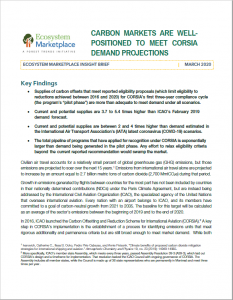CORSIA Market Analysis: Global Carbon Markets Can More than Meet Civil Aviation Demand
View PublicationGlobal airlines are committed to delivering “carbon neutral growth” in flights between countries, even if international air traffic doubles or triples, as some are projecting. That commitment kicks in next year, and a key vehicle for meeting it is the Carbon Offsetting and Reduction Scheme for International Aviation, or CORSIA market.
Created through the UN’s International Civil Aviation Organization (ICAO), CORSIA will only deliver carbon-neutral growth if it recognizes a universe of offsets that’s large enough to meet variable demand but small enough to incentivize new activities that reduce emissions.
An analysis by Forest Trends’ Ecosystem Marketplace shows that there is, indeed, more than adequate supply. Specifically, we have identified 386 million existing emissions units, each representing one metric ton of verified emission reduction, that are expected to meet ICAO’s previously published Emissions Units Eligibility Criteria and fall within the 2016-2020 time period. We have also identified an additional 183 million units in the development pipeline, for a potential supply of 569 million units. On the demand side, ICAO in February 2019 estimated cumulative pilot-phase demand at 104 million units.
Key Findings
- Supplies of carbon offsets that meet reported eligibility proposals (which limit eligibility to reductions achieved between 2016 and 2020) for CORSIA’s first three-year compliance cycle(the program’s “pilot phase”) are more than adequate to meet demand under all scenarios.
- Current and potential supplies are 3.7 to 5.4 times higher than ICAO’s February 2019 demand forecast.
- Current and potential supplies are between 2 and 4 times higher than demand estimated in the International Air Transport Association’s (IATA) latest coronavirus (COVID-19) scenarios.
- The total pipeline of programs that have applied for recognition under the CORSIA market is exponentially larger than demand being generated in the pilot phase. Any effort to relax eligibility criteria beyond the current reported recommendation would swamp the market.

